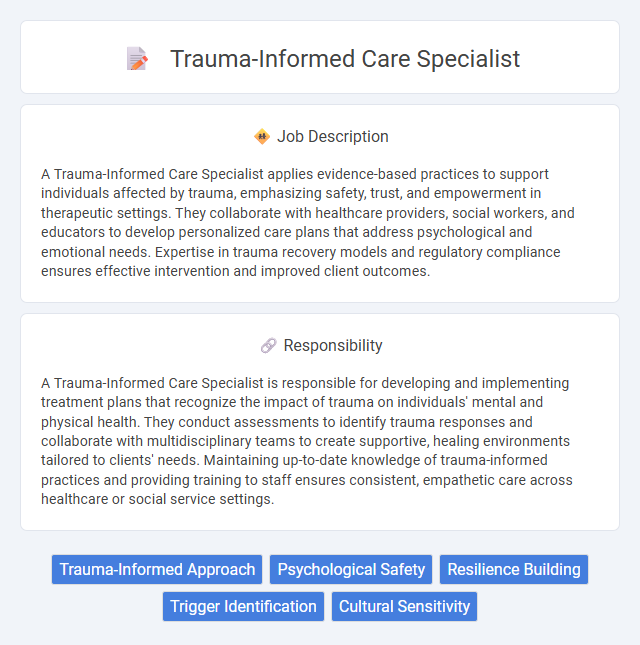
A Trauma-Informed Care Specialist applies evidence-based practices to support individuals affected by trauma, emphasizing safety, trust, and empowerment in therapeutic settings. They collaborate with healthcare providers, social workers, and educators to develop personalized care plans that address psychological and emotional needs. Expertise in trauma recovery models and regulatory compliance ensures effective intervention and improved client outcomes.
Individuals who have a strong capacity for empathy and resilience are likely to be well-suited for the role of a Trauma-Informed Care Specialist, as the job demands sensitivity to the complex emotional and psychological needs of trauma survivors. Those who may struggle with high-stress environments or have difficulty managing emotional boundaries might find this role challenging. Candidates with a background in mental health, counseling, or social work tend to have a higher probability of succeeding in this position, given the specialized skills required to provide effective support.
Qualification
A Trauma-Informed Care Specialist must possess a deep understanding of psychological trauma and its impact on individuals across diverse populations. Qualifications often include a bachelor's or master's degree in psychology, social work, counseling, or a related field, complemented by specialized training or certification in trauma-informed care practices. Experience in mental health services, crisis intervention, and familiarity with evidence-based trauma therapies are essential for effectively supporting trauma survivors and promoting recovery.
Responsibility
A Trauma-Informed Care Specialist is responsible for developing and implementing treatment plans that recognize the impact of trauma on individuals' mental and physical health. They conduct assessments to identify trauma responses and collaborate with multidisciplinary teams to create supportive, healing environments tailored to clients' needs. Maintaining up-to-date knowledge of trauma-informed practices and providing training to staff ensures consistent, empathetic care across healthcare or social service settings.
Benefit
Working as a Trauma-Informed Care Specialist probably offers the benefit of making a meaningful impact on clients' healing journeys by addressing the underlying trauma that affects their well-being. This role likely enhances professional skills in empathy, communication, and trauma-sensitive interventions, increasing career advancement opportunities in mental health fields. The position may also provide a fulfilling work environment aligned with values of compassion and holistic care.
Challenge
Working as a Trauma-Informed Care Specialist likely involves managing complex emotional and psychological challenges, as clients often present with deep-seated trauma requiring sensitive and knowledgeable approaches. Navigating the intricacies of trauma responses may demand continuous adaptation and application of specialized strategies to foster healing and resilience. The role probably requires balancing empathy with professional boundaries, which could be challenging in high-stress or crisis situations.
Career Advancement
Trauma-Informed Care Specialists play a critical role in supporting individuals impacted by trauma, offering psychological and emotional assistance tailored to their needs. Advancing in this career often involves obtaining specialized certifications in trauma therapy or mental health counseling and gaining experience in clinical settings or community organizations. Leadership roles, such as program coordinators or clinical supervisors, become accessible as professionals deepen their expertise in trauma-informed methodologies and contribute to policy development or staff training initiatives.
Key Terms
Trauma-Informed Approach
A Trauma-Informed Care Specialist implements comprehensive strategies that recognize and respond to the pervasive impacts of trauma on individuals' mental, emotional, and physical health. This role requires expertise in creating safe environments, promoting empowerment, and integrating trauma-sensitive practices across healthcare, social services, and educational settings. Mastery of trauma-informed frameworks helps reduce retraumatization and enhances client engagement and recovery outcomes.
Psychological Safety
A Trauma-Informed Care Specialist ensures psychological safety by creating environments where survivors feel secure, respected, and empowered during treatment. They apply evidence-based strategies to recognize trauma symptoms and prevent re-traumatization, fostering trust and emotional stability. Expertise in trauma psychology and empathetic communication enhances client resilience and supports recovery in clinical or community settings.
Resilience Building
Trauma-Informed Care Specialists play a crucial role in resilience building by creating safe and supportive environments that empower individuals to recover from traumatic experiences. They use evidence-based interventions and trauma-sensitive approaches to enhance coping skills, emotional regulation, and adaptive functioning. Their expertise in recognizing trauma triggers and fostering trust helps clients develop long-term resilience and improved mental health outcomes.
Trigger Identification
Trauma-Informed Care Specialists excel in trigger identification by thoroughly assessing environmental, emotional, and behavioral cues that may provoke trauma responses in clients. Their expertise enables the development of personalized safety plans and coping strategies designed to minimize re-traumatization and promote emotional regulation. Utilizing evidence-based practices, they collaborate with interdisciplinary teams to ensure consistent, trauma-sensitive support across all care settings.
Cultural Sensitivity
A Trauma-Informed Care Specialist integrates cultural sensitivity to tailor support strategies that respect and acknowledge diverse backgrounds and experiences, improving therapeutic outcomes. Emphasizing cultural competence enhances communication, fosters trust, and mitigates retraumatization in clients from various ethnic, racial, and cultural groups. Mastery in culturally responsive trauma care contributes to inclusive practices essential for effective mental health and social services.
 kuljobs.com
kuljobs.com